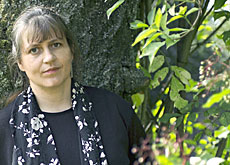An alternative approach to ethical banking

Rightly or wrongly, most people do not immediately associate Swiss banks with "alternative" or "ethics-based" approaches to business.
But the Alternative Bank (ABS), in the central town of Olten, has spent 15 years proving that such approaches can work even in the profit-centred world of financial services.
In an interview with swissinfo, managing director Christa Joss says that what is different about ABS is not the business structures but the underlying ethical criteria.
The ABS has its roots in a working group set up in 1987 – shortly before the “Black Monday” stock market crash floored the entire banking sector and left the infant project struggling to survive.
Many banking institutions had to close following the crash, so there was general amazement when ABS nonetheless opened for business in 1990.
Joss took the reigns at the bank earlier this year.
swissinfo: Does ABS organise its business the same way as traditional banks?
Christa Joss: We are actually a typical retail bank, with numerous small customer deposits. We divide our business activities between assets and liabilities, just like any traditional bank.
On the asset side we make loans, on the liability side we procure money ourselves, via savings accounts or medium term bonds.
It is not these structures that are alternative, but the business criteria and corporate culture.
swissinfo: In what shape and form does it take?
C. J.: Compared to conventional banks, we go much further in adhering to certain values. We also monitor whether they are really being followed.
We base ourselves on our statutes, commit ourselves to transparency and design our products accordingly. It is all about ethical banking. We are not alone in this – our customers act the same way.
swissinfo: Can you give a concrete example?
C.J.: We began asking customers where their money comes from before laws on money-laundering even existed. Also, we never accept untaxed money.
Our customers can have a say in deciding where and how their money should be invested, for instance in programmes to support organic farming, alternative energy sources or state-funded housing.
If customers agree to receive less interest, then loan terms for companies become more attractive.
Furthermore, several firms get credit terms from us that they could not get from traditional banks, because the costs would be too high.
swissinfo: Are we slowly moving towards a convergence of traditional and alternative business criteria for banking?
C.J.: If the day comes when we can no longer think of anything we should do differently from the mainstream banks, because they are already applying our ethical criteria, then we will have achieved our aim.
My personal goal, and that of the organisation, is not just to ensure that we still exist in 15 years time, but to make banking in general a more ethical business.
Unfortunately, that does not seem to be happening very fast. We still have a way to go before we achieve our goals.
swissinfo: Is promoting equal opportunity one ethical challenge that still needs to be realised?
C.J.: Compared to the mainstream banks, we have a higher proportion of female customers. It seems that our values appeal more powerfully to women.
We also set ourselves equal opportunity goals, and combine these with salary transparency and the promotion of part-time work. Our corporate culture is certainly different to that of the traditional banks.
However, we distance ourselves from the idea of quotas as the sole means of achieving equal opportunity
swissinfo: Are there customers who share your values, but still look for interest rates more in line with market norms?
C.J.: Savers generally accept the principle of earning slightly less interest if they can then choose to invest in specific projects and companies.
However, on the loans side of the business, terms in line with market norms are much more important.
Interest rates are currently extremely low, and the traditional banks have a very large liquidity surplus, so they often undercut us.
Occasionally, that puts us in a difficult position when it comes to formulating terms, so some deals do actually fail to materialise.
swissinfo-interview: Alexander Künzle in Olten
ABS is based in Olten and has a branch in Lausanne and contact points in Zurich and Geneva.
It describes itself as an “ecologically and socially oriented specialist bank” that operates nationwide.
Its total assets increased from SFr148 million at the end of 1994 to SFr649 million ten years later.
ABS employs more than 40 people (full-time equivalents).
ABS organises its business much like a traditional bank, with a balance between savings (assets) and loans (liabilities).
Joss says the real difference lies in the choice of business criteria and the corporate culture.
She says competition is sometimes tough, but ABS continues to pursue its goal of making banking “a more ethical business”.

In compliance with the JTI standards
More: SWI swissinfo.ch certified by the Journalism Trust Initiative











You can find an overview of ongoing debates with our journalists here . Please join us!
If you want to start a conversation about a topic raised in this article or want to report factual errors, email us at english@swissinfo.ch.